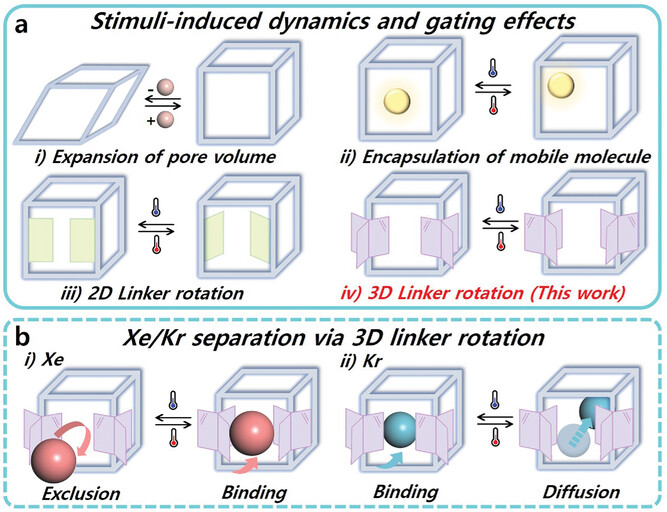Switchable Xe/Kr Selectivity in a Hofmann-Type Metal–Organic Framework via Temperature-Responsive Rotational Dynamics
-
Authors :
Hyojin Kim, Jong Hyeak Choe, Minjung Kang, Dong Won Kang, Hongryeol Yun, Jeongwon Youn, Weon-Gyu Lee, Jung-Hoon Lee, Chang Seop Hong
-
Journal :
Small
-
Vol :
-
Page :
2301905
-
Year :
2023

Abstract
The development of adsorbents for Kr and Xe separation is essential to meet industrial demands and for energy conservation. Although a number of previous studies have focused on Xe-selective adsorbents, stimuli-responsive Xe/Kr-selective adsorbents still remain underdeveloped. Herein, a Hofmann-type framework Co(DABCO)[Ni(CN)4] (referred to as CoNi-DAB; DABCO = 1,4-diazabicyclo[2,2,2]octane) that provides a temperature-dependent switchable Xe/Kr separation performance is reported. CoNi-DAB showed high Kr/Xe (0.8/0.2) selectivity with significant Kr adsorption at 195 K as well as high Xe/Kr (0.2/0.8) selectivity with superior Xe adsorption at 298 K. Such adsorption features are associated with the temperature-dependent rotational configuration of the DABCO ligand, which affects the kinetic gate-opening temperature of Xe and Kr. The packing densities of Xe (2.886 g cm−3 at 298 K) and Kr (2.399 g cm−3 at 195 K) inside the framework are remarkable and comparable with those of liquid Xe (3.057 g cm−3) and liquid Kr (2.413 g cm−3), respectively. Breakthrough experiments confirm the temperature-dependent reverse separation performance of CoNi-DAB at 298 K under dry and wet (88% relative humidity) conditions and at 195 K under dry conditions. The unique adsorption behavior is also verified through van der Waals (vdW)-corrected density functional theory (DFT) calculations and nudged elastic band (NEB) simulations.
















